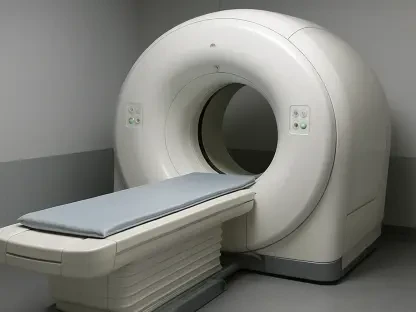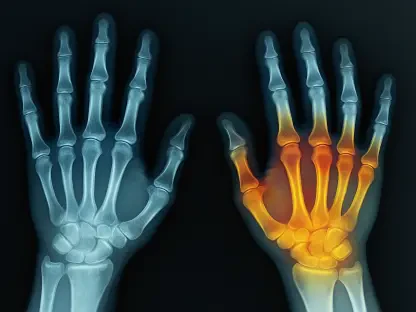At Washington University School of Medicine in St. Louis, a transformative research initiative is shedding light on the perplexing world of immune system disorders, conditions that can silently undermine the body’s defenses and lead to life-altering complications. Spearheaded by Megan A. Cooper, MD, PhD, this ambitious project is backed by a substantial $12.4 million grant from the National Institute of Allergy and Infectious Diseases, part of the National Institutes of Health. The mission is to delve into the hidden genetic underpinnings of immune deficiencies, particularly for children and adults who continue to suffer without a clear diagnosis despite advancements in genetic testing. These disorders often manifest as a weakened ability to combat infections, paving the way for severe issues such as autoimmunity, chronic inflammation, and heightened cancer risks. This effort stands as a beacon of hope for countless individuals, aiming to bridge the gap between medical mysteries and tangible solutions through innovative science.
Challenges in Diagnosing Immune Disorders
The Complexity of Symptoms
Immune system disorders present a formidable challenge due to their rarity and the bewildering array of symptoms they produce, making accurate diagnosis an uphill battle for clinicians. Patients might endure prolonged fevers that defy explanation, battle frequent or unusual infections that standard treatments fail to resolve, or grapple with autoimmune conditions where the body inexplicably attacks itself. Additionally, some face heightened risks of cancer or suffer from severe allergic reactions, with no two individuals exhibiting the exact same clinical picture. This wide variability often leaves medical professionals puzzled, as symptoms can mimic other conditions or fluctuate unpredictably over time. The result is a frustrating cycle of misdiagnosis or delayed diagnosis, which prevents patients from receiving the focused care they desperately need to manage their health effectively and maintain a semblance of normalcy in their daily lives.
Beyond the diversity of symptoms, the impact on patients’ quality of life underscores the urgency of addressing these diagnostic hurdles with innovative approaches. For many, the absence of a definitive diagnosis means living with uncertainty, undergoing countless tests, and enduring treatments that may not target the root cause of their ailment. This lack of clarity can lead to emotional and physical exhaustion, as individuals and their families navigate a healthcare system that struggles to keep pace with such complex conditions. The variability in presentation also complicates clinical research, as standardizing diagnostic criteria becomes a daunting task when symptoms differ so widely. Efforts to understand these disorders must therefore prioritize unraveling the unique ways in which they manifest, ensuring that each patient’s experience informs the broader quest for answers and ultimately drives the development of more precise medical interventions.
Limitations of Current Testing
Despite significant strides in genetic testing, a substantial gap remains in identifying the causes of immune disorders, leaving a majority of patients without answers. Current sequencing technologies have successfully cataloged around 550 genetic conditions associated with immune deficiencies, a remarkable achievement in medical science. However, an estimated 70% of individuals with suspected immune issues still lack a diagnosis, as standard tests primarily detect mutations present from birth and affecting all cells uniformly. These methods often fail to identify rarer genetic alterations that may emerge later in life or be confined to specific tissues, rendering them invisible to conventional approaches. This diagnostic shortfall means that many patients continue to suffer without a clear path to treatment, highlighting the critical need for more advanced tools to uncover the full spectrum of genetic contributors to these conditions.
Moreover, the limitations of existing testing methods have broader implications for the management of immune disorders and the direction of future research. When genetic sequencing misses subtle or localized mutations, clinicians are often forced to rely on broad, non-specific therapies that may not address the underlying issue and can sometimes cause additional side effects. This gap also hinders the ability to predict disease progression or identify at-risk family members who might carry similar genetic traits. The frustration of undiagnosed cases drives home the importance of evolving beyond traditional testing frameworks to embrace technologies that offer deeper insights into the genome. Addressing these shortcomings is not just about improving diagnostics but about transforming the entire approach to patient care, ensuring that treatments are as precise as possible and tailored to the unique genetic makeup of each individual.
Innovative Approaches to Genetic Research
Harnessing Deep Sequencing
To overcome the shortcomings of standard genetic testing, researchers at WashU Medicine are turning to cutting-edge techniques like deep sequencing, a method that promises unprecedented precision in detecting genetic anomalies. Unlike conventional sequencing, which may overlook subtle changes, deep sequencing examines genes at a granular level, capable of identifying mutations present in just a small subset of cells. This approach, led by Megan A. Cooper in collaboration with experts such as Dusan Bogunovic, PhD, and Joshua Milner, MD, from Columbia University, aims to uncover hidden genetic causes of immune deficiencies that have eluded diagnosis for years. By focusing on these minute alterations, the team seeks to provide answers to patients who have long been trapped in a cycle of uncertainty, potentially unlocking new pathways to effective treatment and significantly altering the landscape of immunological care.
The adoption of deep sequencing also represents a broader shift in medical research toward embracing technologies that push the boundaries of what is possible in diagnostics. This method’s ability to detect low-frequency mutations offers a lifeline to those whose conditions have been dismissed as unexplainable, providing a clearer picture of the genetic factors at play. Furthermore, the data generated from such detailed analyses can contribute to a growing repository of knowledge, helping to refine diagnostic criteria and inform future studies. As this technology becomes more integrated into clinical practice, it could set a new standard for how immune disorders are identified and managed, ensuring that even the most elusive genetic changes are no longer beyond reach. The implications extend beyond individual patients, potentially reshaping protocols for screening and early intervention across the field of immunology.
Exploring Genetic Variability
Another critical facet of this research delves into the puzzling variability of genetic expression, particularly why some individuals with identical mutations develop severe immune disorders while others remain unaffected. Under the guidance of Dusan Bogunovic, the team is investigating mechanisms that determine whether a faulty or healthy gene copy remains active within a person’s cells. This phenomenon, often seen within families, suggests that additional factors—beyond the mutation itself—play a role in disease manifestation. Understanding these underlying processes could reveal why certain genetic defects trigger illness in some but not others, offering new insights into the complex interplay of heredity and health. Such findings are poised to refine diagnostic approaches, ensuring that risk assessments account for more than just the presence of a mutation.
In parallel, Joshua Milner’s research focuses on how combinations of common genetic variations, rather than single mutations, contribute to the risk and severity of immune disorders. This perspective shifts the focus from isolated genetic flaws to a broader view of how multiple genetic factors interact to influence disease outcomes. By correlating these genetic profiles with patient symptoms, the team aims to construct a more comprehensive model of immune deficiencies, one that acknowledges the cumulative impact of subtle variations. This approach not only enhances the understanding of disease mechanisms but also paves the way for predictive tools that could identify at-risk individuals before symptoms emerge. The exploration of genetic variability underscores the nuanced nature of immune disorders, emphasizing the need for a multifaceted strategy to tackle their root causes and improve patient care.
The Push for Precision Medicine
Transforming Patient Outcomes
The drive toward precision medicine is at the heart of this research, reflecting a growing consensus in medical science that personalized care holds the key to better managing immune disorders. A precise genetic diagnosis can be a game-changer, opening the door to life-saving treatments tailored to an individual’s unique biological makeup rather than relying on generic, often ineffective therapies. This shift away from one-size-fits-all approaches means that patients could receive interventions designed to target the specific mechanisms driving their condition, whether that involves mitigating autoimmunity or bolstering infection resistance. The potential to transform outcomes is immense, as accurate diagnoses enable not just treatment but also proactive strategies to prevent complications, ultimately enhancing quality of life for those affected by these challenging disorders.
Additionally, the emphasis on precision medicine aligns with a broader trend to integrate genetic insights into every facet of healthcare, from diagnosis to long-term disease management. When patients receive a clear understanding of the genetic basis of their immune deficiency, it empowers clinicians to monitor for specific risks, such as cancer susceptibility, and adjust care plans accordingly. This targeted approach also facilitates genetic counseling for families, helping them understand inheritance patterns and prepare for potential health challenges. The research at WashU Medicine exemplifies how far-reaching the benefits of precision medicine can be, promising a future where treatments are as unique as the patients themselves. By prioritizing individualized care, this work sets a precedent for how complex conditions can be addressed with greater accuracy and compassion.
Building on Collaborative Success
Reflecting on the journey, the collaborative efforts at WashU Medicine marked a significant milestone in the battle against immune disorders through a shared commitment to innovation. The partnership among diverse experts, supported by preliminary funding from the NIH, St. Louis Children’s Hospital Foundation, and the Children’s Discovery Institute, fostered an environment where groundbreaking ideas thrived. Contributions from investigators like Obi L. Griffith, PhD, and Malachi Griffith, PhD, enriched the project with multidisciplinary perspectives, ensuring a robust approach to tackling diagnostic challenges. This teamwork proved essential in laying the groundwork for advanced techniques like deep sequencing, which emerged as a cornerstone of the research. Looking ahead, the next steps involve expanding these collaborative networks to refine genetic tools further, ensuring that the momentum built continues to drive progress in identifying and treating immune deficiencies with unparalleled precision.
Moreover, the success of this initiative highlighted the value of sustained investment in medical research to address unmet needs in patient care. As findings from past efforts inform ongoing studies, the focus remains on translating genetic discoveries into actionable clinical strategies that can be implemented widely. Future considerations include developing accessible diagnostic platforms that incorporate the latest sequencing technologies, making precision medicine a reality for more patients. Additionally, fostering dialogue between researchers, healthcare providers, and patient communities will be crucial to ensure that emerging solutions meet real-world demands. The path forward lies in building on these collaborative foundations, advocating for policies that support genetic research, and ultimately ensuring that every individual with an immune disorder gains access to the tailored care they deserve.









